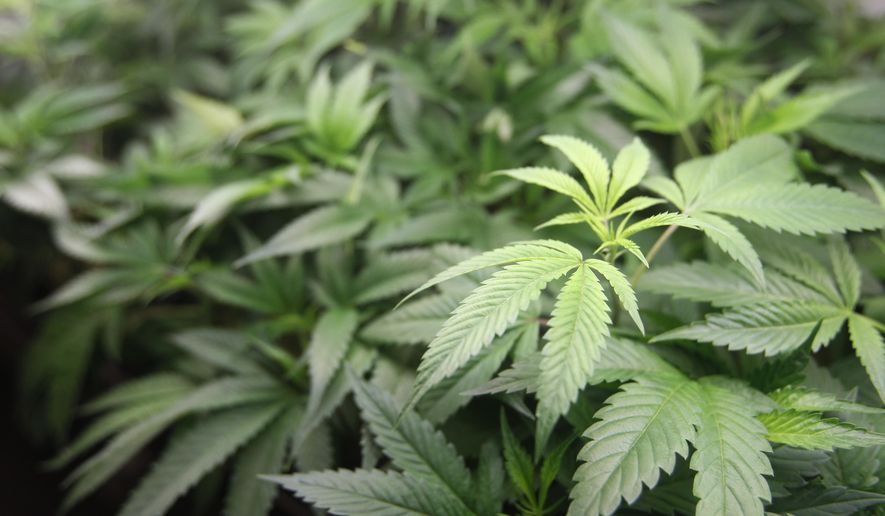President Biden will pardon everyone convicted on federal charges of simple marijuana possession, the White House announced Thursday, saying he intended to repair America’s “failed approach” to the drug.
The president also was expected to call on governors to pardon state-level convictions in a recorded video statement later Thursday.
“As I said when I ran for president, no one should be in jail just for using or possessing marijuana,” Mr. Biden said in a statement. “Too many lives have been upended because of our failed approach to marijuana. It’s time that we right these wrongs.”
The marijuana pardon, announced just a month before the Nov. 8 midterm elections, delivers a gift to the Democrats’ liberal base that has clamored for legalizing weed at the federal level and has been disappointed by the party’s failure to deliver on overhauling policing laws.
Some proponents of legalizing marijuana argue that convictions hit Black Americans disproportionately.
An American Civil Liberties Union study of national arrest data from 2020 found that Black people are nearly four times more likely to be arrested on charges of marijuana possession than White people, though marijuana use is roughly equal among Black and White Americans.
White House officials said the president elected to take executive action on marijuana after several efforts failed in Congress. They estimated that more than 6,500 people will have prior federal convictions for simple marijuana possession reversed as well as “thousands more” convicted under local code in the District of Columbia, which falls under federal guidelines.
The rollback of marijuana convictions, however, was issued during a nationwide crime wave that includes spikes in killings, carjackings and robberies. Critics said the pot pardon was more of the left’s soft-on-crime policies that fuel lawlessness.
“In the middle of a crime wave and on the brink of a recession, Joe Biden is giving blanket pardons to pot heads — many of whom pled down from more serious charges. This is a desperate attempt to distract from failed leadership,” tweeted Sen. Tom Cotton, Arkansas Republican.
Still, Democrats did a victory dance.
“The only way to repair the harm caused in communities across the country is to end the War on Drugs, and invest intentionally in education, housing, healthcare, and employment,” Rep. Ilhan Omar, a Minnesota Democrat and member of Congress’ far-left “Squad,” said in a Twitter post. “This is a massive step in the right direction.”
In addition to overriding past charges, Mr. Biden has asked Health and Human Services Secretary Xavier Bacerra and Attorney General Merrick Garland to “expeditiously” review “how marijuana is scheduled under federal law.”
“The federal government currently classifies marijuana as a ‘schedule one’ substance, the same as heroin and LSD – and more serious than fentanyl,” Mr. Biden was to say, per a transcript of his recorded remarks released by the White House. “It makes no sense.”
The Justice Department pledged to “expeditiously administer” the pardons after the White House announcement.
“In coming days, the Office of the Pardon Attorney will begin implementing a process to provide impacted individuals with certificates of pardon,” Justice Department spokesman Anthony Coley said. “Also, in accordance with the president’s directive, Justice Department officials will work with our colleagues at the Department of Health and Human Services as they launch a scientific review of how marijuana is scheduled under federal law.”
Mr. Biden’s proclamation applies to those who have committed the offense of “simple possession of marijuana” on or before the date of the president’s pardon, regardless of whether they have gone to trial.
Simple possession is a misdemeanor offense when a person is caught with a “small amount” of marijuana that is deemed to be for personal consumption and without the intent to distribute or sell it, according to the U.S. Sentencing Commission. Those charged with simple possession faced up to one year in prison and a minimum fine of $1,000 under previous guidelines.
No individuals charged solely with simple possession are in federal prison, the White House said.
Mr. Biden’s action does not apply to substances beyond marijuana, nor does it apply to non-U.S. citizens.
White House officials said the pot pardon builds on Mr. Biden’s efforts to reverse racial disparities that arise because of incarceration. In April, Mr. Biden pardoned three felons and commuted sentences of 75 others convicted of low-level drug offenses.
The move echoes President Obama’s push to reduce or eliminate sentences for nonviolent drug offenders.
Mr. Biden said his measure should not affect federal and state limitations on marijuana sales.
“Even as federal and state regulation of marijuana changes, important limitations on trafficking, marketing and underage sales should stay in place,” he said.
Mr. Biden has come under fire from opponents over his National Drug Control Strategy aimed at addressing addiction and overdoses amid a raging drug crisis fueled in part by a spike in the deadly drug fentanyl, which has been pouring into the U.S. through the southern border at record-high levels.
Critics say the president’s focus on liberal “harm reduction” measures does little to combat the epidemic and threatens to “weaken our fight against drug use.”
In February, after it was revealed that the Department of Justice was reportedly considering supporting the use of supervised injection sites, which it previously opposed, a group of senators led by Sen. Chuck Grassley of Iowa, the top Republican on the Senate Judiciary Committee, wrote to Mr. Biden to express “grave concern about how your administration is handling the drug epidemic.”
The lawmakers wrote that Mr. Biden’s approach has resulted in “radicalized, illegal and dangerous acts” while failing to address the spike in drug addiction and overdose.
“Too many Americans have died at the hands of illicit drugs,” the lawmakers wrote. “No branch of the federal government, and no amount of power vested in the president, should make access to illicit drugs easier.”
• Joseph Clark can be reached at jclark@washingtontimes.com.




Please read our comment policy before commenting.